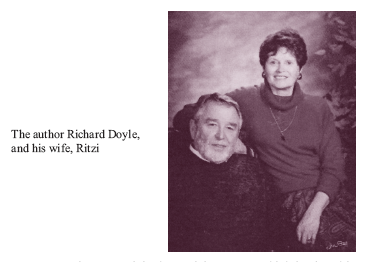BOOK SHELF
"Doyle's War: Save the Males" by R.F. Doyle, published by Poor Richard's Press. $14.95 paper or $3.99 digital U.S. currency. Available from rich@mensdefense.org Reviewed by John Morrissey
Just when you thought that all domestic conflict was initiated by violent and patriarchal men oppressing their wives and partners, along comes a writer like R.F.Doyle with a compelling case that it is men who are victimised by both our society and a legal system which is far from impartial. Although the context is the USA and the numerous case studies cover a period of decades, the work being an update of a previous publication, many of the stories will resonate with Australians who have noted similar injustices here.
 Doyle's thesis is that men suffer disproportionately from divorce,
are victimised by the justice system, and suffer cultural and economic
discrimination, while there is a gigantic conspiracy of politicians,
the legal profession, the media and the feminist movement
to make their lives a misery. He even counsels any man to beware
of marriage and procreation, where the whims of a wife will ruin
him, as he is up against 'an unholy alliance of the divorce system
and feminist philosophy'. Case studies include jailing for contempt
of court when evicted husbands do not appear when summoned.
He cites the case of a submariner serving in the Pacific who not
only lost custody of a child but faced an arrest warrant for failure
to appear in court. Military victims appear in many of his case
studies.
Doyle's thesis is that men suffer disproportionately from divorce,
are victimised by the justice system, and suffer cultural and economic
discrimination, while there is a gigantic conspiracy of politicians,
the legal profession, the media and the feminist movement
to make their lives a misery. He even counsels any man to beware
of marriage and procreation, where the whims of a wife will ruin
him, as he is up against 'an unholy alliance of the divorce system
and feminist philosophy'. Case studies include jailing for contempt
of court when evicted husbands do not appear when summoned.
He cites the case of a submariner serving in the Pacific who not
only lost custody of a child but faced an arrest warrant for failure
to appear in court. Military victims appear in many of his case
studies.
When Doyle speaks of men 'driven over the edge by divorce', we might reflect on incidents in Australia, where desperate husbands have done terrible things, sometimes to their own children on access visits. His concern is for husbands made homeless, then jobless, while still being hounded by the courts for alimony and child support, though sometimes on skid row.
He also refers to the wiles of divorced wives who, with impunity, make court ordered access impossible, and we know that this often occurs in Australia, when moving interstate with new partners cuts off children from their fathers. And the presumption of the courts is always in favour of the mothers, regardless of research showing the statistics of the outcomes for fatherless children. Doyle emphasises the effects on boys, where the correlation with delinquency and crime statistics is irrefutable, but the absence of a father for a girl is equally harmful, as readers of US doctor Meg Meeker's Strong Fathers, Strong Daughters: 10 Secrets Every Father Should Know would realise.
Women do the crime; men do the time. Doyle provides shocking examples of the gender bias in court sentences, where no mercy is shown towards men, while women are treated with sympathy. An example is that of Brenda Nesselroad - Slaby, whose 2-year-old daughter died after being left in a closed car for eight hours in 100 degrees F. A county prosecutor declared it a 'substantial lapse of due care', but declined to lay charges as it did not meet a definition of reckless conduct. The writer cites numerous cases like this, contrasting them with others, especially where men are jailed for up to 20 years in battered baby cases, while the far more frequent women offenders are referred for psychological treatment.
Regarding child support, the writer reveals some scandalous miscarriages of justice, including a celebrated Australian case. Essentially, men are frequently held responsible for the support of children sired by others, as at birth their names are registered as fathers. On this basis, subsequent DNA evidence can be ignored by the court. Doyle quotes one survey which suggests that as many as 40% of liberated young married women have had extra-marital affairs.
In attempting to explain the social contexts which lead to this inversion of justice, Doyle roams far and wide. Cohabitation, welfare, single parenthood, androgyny, pop culture, feminised males and homosexuality - for which his disgust is conveyed in graphic terms - all get scathing analysis. In the workplace, quotas and affirmative action also take their toll on men. Interestingly, traditional chivalry, based on the 'false axiom that all women are ladies', he sees surviving 'in a perverted sense' to shape the judgements of 'judicial Galahads'. In the courts and in society generally, while lip service is paid to equality, women are more equal, demanding all the perks, while the old mutually-beneficial tradeoffs have been ditched by feminism.
Doyle devotes the final section of his work with his prescriptions for reform of this unequal situation. First, marriage must be defended from the predatory divorce industry, which motivates women to exercise their power to gain custody, alimony, support and most of the property. Where divorce occurs, fairness must be observed, with merit - not gender - the criterion for settlement. This really requires rethinking the No-Fault divorce principle, introduced to avoid conflict and mud-slinging. He draws on some impressive research when addressing custody, all of which comes down to abandoning the 'superfluous father' notion. Other suggestions include punishing false allegations, exposing myths and restoring the tradeoffs in chivalry.
Crammed with passionate arguments, case studies and references to research, this book is quite demanding of the reader, as well as being distressing. Many would dismiss it as exaggeration, male chauvinism or even misogyny, but Doyle makes his case too powerfully to ignore. When 50 years ago Spike Milligan, in his unforgettable novel "Puckoon", described an Irish harridan consulting her divorce lawyer, I thought this was a fantasy. The lawyer asked whether her husband failed as a provider, to which she replied that he handed over his pay packet every Thursday. When asked if he ever beat her, she snarled that he wouldn't dare. Finally the lawyer asked if he had ever been unfaithful. She answered, "I think we've got him there. I know for certain that the last one wasn't his!"

